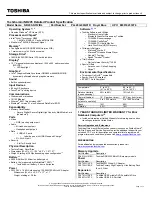
1. Set a power-on password as well as a hard disk password for your internal hard disk drive. Refer to
the procedures in “Power-on password” on page 44 and “Hard disk passwords” on page 44. For
security, a longer password is recommended.
2. If a Disk Encryption hard disk drive is installed in your computer, be sure to protect the contents of your
computer memory from unauthorized access by use of drive encryption software.
3. Before you dispose of, sell, or hand over your computer, be sure to delete data stored on it. Refer to
“Notice on deleting data from your hard disk drive” on page 48.
Note:
The hard disk drive built into your computer can be protected by UEFI BIOS.
Notice on deleting data from your hard disk drive
Some of the data stored on the hard disk drive might be sensitive. Handing your computer over to someone
else without deleting the installed software, such as operating systems and application software, might even
violate license agreements. Be sure to delete data stored on the hard disk drive before you dispose of, sell,
or hand over your computer.
You can use the following methods to delete data from the hard disk drive:
• Move the data to the Recycle Bin, and then empty the Recycle Bin.
• Delete the data.
• Format your hard disk drive, using the software for initializing it.
• Use the recovery program provided by Lenovo to bring the hard disk drive back to the factory default
settings.
These operations, however, only change the file location of the data; they do not delete the data itself. In
other words, the data retrieval processing is disabled under an operating system such as Windows. The
data is still there, even though it seems to be lost. Thus, it is sometimes possible to read the data by use of
special software for data recovery. There is a risk that people of bad faith might read and misuse the critical
data on hard disk drives for unexpected purposes.
To prevent leakage of data, it is important that you delete all the data from the hard disk drive when you
dispose of, sell, or hand over your computer. You can destroy the data physically by smashing the hard disk
drive with a hammer, or magnetically by means of strong magnetic power, thus making the data unreadable.
But it is recommended that you use the software (payware) or service (pay service) developed for that
purpose. The process might take several hours.
For disposing of data on the hard disk drive, Lenovo provides the Secure Data Disposal
TM
tool. Go to
http://www.lenovo.com/support to download this tool.
If a Disk Encryption hard disk drive is supported and installed in your computer, you can logically dispose of
all the data on the drive in a short time by erasing the cryptographic key. The data encrypted with the old key
is not physically erased but remains on the drive; however, it cannot be decrypted without the old key. This
feature is also available with the Drive Erase Utility for Resetting the Cryptographic Key.
Using firewalls
If your system is preinstalled with a firewall program, it protects against computer Internet security threats,
unauthorized access, intrusions, and Internet attacks. It also protects your privacy.
For more information about how to use the firewall program, refer to the help information system that
comes with the program.
48
User Guide
Summary of Contents for ThinkPad Edge E145
Page 1: ...User Guide ThinkPad Edge E145 ...
Page 6: ...iv User Guide ...
Page 34: ...18 User Guide ...
Page 66: ...50 User Guide ...
Page 76: ...60 User Guide ...
Page 94: ...78 User Guide ...
Page 112: ...96 User Guide ...
Page 118: ...102 User Guide ...
Page 136: ...120 User Guide ...
Page 146: ...130 User Guide ...
Page 150: ...134 User Guide ...
Page 157: ......
Page 158: ......
















































